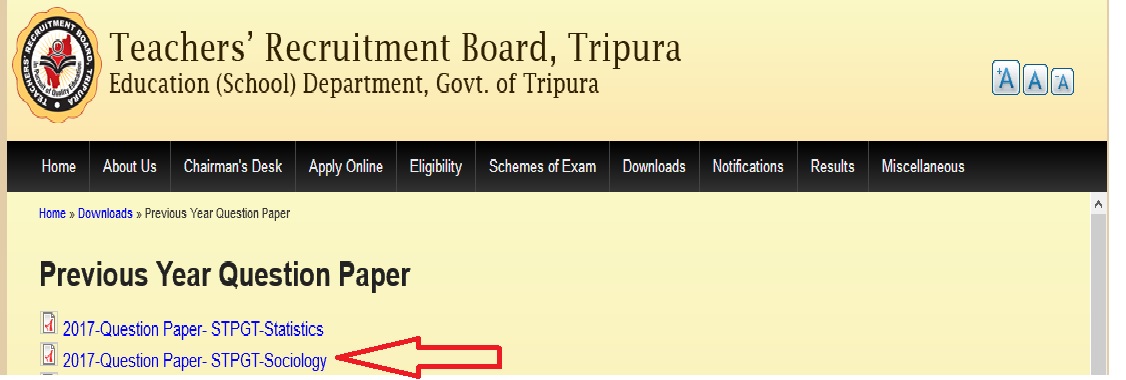trb.tripura.gov.in STPGT Sociology Previous Question Paper : Selection Test for Post Graduate Teachers
Organisation : Teachers’ Recruitment Board, Tripura
Exam : STPGT – Selection Test for Post Graduate Teachers
Document Type : Previous Year Question Paper
Subject : Sociology
Code No : AF17—XVIII
Year : 2017
Website : https://trb.tripura.gov.in/
TRB Tripura STPGT Sociology Previous Question Paper
Question Paper of TRB Tripura Selection Test for Post Graduate Teachers Sociology Question Paper 2017 is now available in the official website of Teachers’ Recruitment Board, Tripura
Related : Teachers’ Recruitment Board STPGT Statistics Question Paper : https://www.pdfquestion.in/29445.html
Instructions for Candidates
1. Use Black Ballpoint Pen only for writing particulars of this Question Booklet and marking responses on the OMR Answer Sheet.
2. This test is of 2 hours and 30 minutes duration and consists of 75 MCQ-type questions. Each question carries 2 marks.

3. There is no negative marking for any wrong answer.
4. Rough work should be done only in the space provided in the Question Booklet.
5. The answers are to be marked on the OMR Answer Sheet only. Mark your responses carefully since there is no chance of alteration/correction.
6. Use of eraser or whitener is strictly prohibited.
Download Question Paper :
https://www.pdfquestion.in/uploads/STPGTSoc.pdf
Model Questions
Directions : Answer the following questions by selecting the correct option.
1. The term ‘sociology’ was introduced by
(A) H. Spencer
(B) E. Durkheim
(C) A. Comte
(D) M. Weber
2. Which among the following factors did not contribute in the emergence of sociology as a separate discipline?
(A) Enlightenment
(B) French Revolution
(C) Industrial Revolution
(D) Globalization
3. Interactionist perspective of sociology focuses at
(A) macrolevel
(B) microlevel
(C) Both of the above
(D) None of the above
4. Which of the following statements is true?
(A) Sociology is value neutral.
(B) Sociology is generalizing science.
(C) Sociology is rational and empirical.
(D) All of the above
5. The Latin word ‘socius’ means
(A) companion
(B) comparison
(C) analysis
(D) science
6. ‘Order’ and ‘stability’ are emphasized by
(A) Functionalists
(B) Conflict theorists
(C) Exchange theorists
(D) Phenomenologists
7. Which among the following is not a branch of sociology?
(A) Sociology of religion
(B) Political sociology
(C) Industrial sociology
(D) Ethnic sociology
8. The feature of community is
(A) community rivalry
(B) community sentiment
(C) community conflict
(D) All of the above
9. Who defined society as ‘a web of social relationship’?
(A) Bogardus
(B) Ginsberg
(C) MacIver
(D) Giddens
10. ‘An organization deliberately formed for the collective pursuit of some interest or set of interests’, is known as
(A) institution
(B) association
(C) group
(D) society
11. Common locality is the physical basis of
(A) association
(B) institution
(C) cooperation
(D) community
12. Which among the following statements is incorrect ?
(A) An association is a group of people.
(B) An institution is a group of people.
(C) Community is smaller than society.
(D) Community is a social group.
13. The expected behaviour associated with a social position is known as
(A) social power
(B) social role
(C) social status
(D) social values
14. Point out the incorrect statement about social institution.
(A) It satisfies human needs.
(B) It controls human behaviour.
(C) It includes standardized norms.
(D) It undergo changes easily and quickly.
15. Social status is related with
(A) power
(B) position
(C) social role
(D) All of the above
16. The conflict experienced by individuals at the time of role playing is called
(A) role conflict
(B) role behaviour
(C) social conflict
(D) social behaviour
17. Which among the following is not an assumption of functionalism?
(A) Society is a system of integrated parts.
(B) Social systems have built-in mechanisms of control.
(C) Social change is drastic and rapid in nature.
(D) Society is a stable organized system.
18. Who distinguished between material and non-material cultures?
(A) Ogburn
(B) Malinowski
(C) Tylor
(D) MacIver
19. Cultural growth is possible through
(A) invention of new traits within the culture
(B) diffusion of traits from outside the culture
(C) Both of the above
(D) None of the above
20. Which among the following is not a sociological perspective?
(A) Functionalist
(B) Associative
(C) Conflict
(D) Interactionist